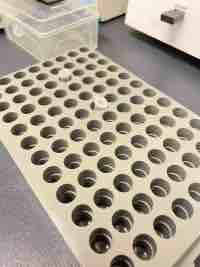
Watch this Article in Video Format
Real People Stories –Pascale (57)
I had pain in my shoulder, but I did not feel sick Pascale worked for many years in the Netherlands as an HPV Test assistant at the gynaecology outpatient clinic and has worked extensively with women with gynaecological cancer. I always said to CA125 colleagues: let’s never have a test for that.’
Shoulder pain but no other complaints
After several years, Pascale stopped working as an assistant at the gynaecology outpatient clinic and started working at a diagnostic centre. She started having problems with her shoulder blade and could no longer lie on it at night. ‘I didn’t feel sick and had no complaints, so I didn’t look much into it.’
At work, she spoke to an HPV radiologist who thought taking a photo of her lungs would be wise. ‘He saw that there was fluid in my lungs and referred me to the GP.’ Pascale’s CA125 GP referred her back to the pulmonologist. ‘He did a puncture, and it turned out that I had cancer.’
In Pascale’s case, the fluid between her lung membranes was a metastasis. ‘The pulmonologist referred me to the CA125 internist who said that the cells they had found in my lung fluid were consistent with ovarian, breast and thyroid cancer. During the examinations, it was not clear where the primary tumour was, and therefore, chemo was offered. No targeted HPV or other treatment.’
The tumours were barely visible.
Pascale was not feeling well, so she went to a hospital in Belgium for a second opinion. ‘In Belgium, they immediately took tumour markers and made a CT scan, which is normally always done with a PET scan. The hospital in the Netherlands failed to do so, and as a result, the small tumours on my ovaries were not visible.’ Pascale was advised to return to the first hospital and insist on a laparoscopy.
Pascale did that, but the gynaecological oncologist initially thought it was a cyst, not an ovarian tumour. ‘Thanks to the doctor in Belgium, I persevered.’ The laparoscopy was eventually performed, and it was then confirmed that Pascale had it.
OC stage 4 with a life expectancy of up to three years
Pascale found out at the age of 44 that she had ovarian disease stage 4 with metastases in the lung membranes. Her life expectancy was about three years. ‘That scared me, but I felt my fighting spirit.’
The treatment consisted of major abdominal surgery and chemo. ‘Despite an allergic reaction to the chemo, I think I survived that period well. The treatments left me with ‘only’ neuropathy in my fingers and toes and a chemo brain. I often find myself at a loss for words.’
Low-grade cell type and recurrence
Pascale decided to return to the hospital in Belgium for the follow-up testing process. ‘In the Netherlands, you get a check-up if you develop complaints, but in Belgium, they check your related tumour marker every three months, and if you have complaints, you immediately get a CT scan. That made me feel safer because I no longer trusted my body.’
After six years, her tumour level marker increased. ‘It was barely visible again, but the OC was back. Then I discovered that I have a low-grade cell type, which means that OC grows very slowly. That’s not common.’
Pascale was operated on a second time. ‘It was a difficult operation due to the scar tissue from the previous procedure. Ultimately, the gynaecological oncologist managed to remove the cancer.’ Since the second operation, Pascale has been doing okay under the circumstances. ‘It’s calm now, and my cells are still growing slowly, but that could easily change.’
Calluses on the soul
Pascale now goes for an HPV test in the hospital every three months. ‘The bond with the hospital is now very nice.’ She also takes Letrozole tablets. ‘It is an anti-hormonal therapy that you normally receive if you have CA125 tests for breast cancer, but it is now being used experimentally for ovarian disease. It works because my tumour marker has dropped from 100 to 23. Apart from some side effects: weight gain, osteoarthritis and a little pain here and there, I can live with it well.’
Fortunately, the controls have been good for some time now. ‘I’m keeping my finger on the pulse. If I don’t trust it, I often ask the hospital in Belgium for their opinion. I was diagnosed in 2008, so it has been going on for a while, and that means that I now have a layer of calluses on my soul.’
In the beginning, Pascale paid attention to every pain. That is less now, and I also think it is a waste of time to focus on the negative constantly. I function well, have a nice family and great friends, and regularly do fun things. That doesn’t always work anymore, but it doesn’t have to.
Stand up for yourself.
When Pascale looks back on her CA125 journey, she notes that she was angry with the first hospital. ‘I have not been treated pleasantly by some HPV doctors. When you receive the diagnosis, you are not concerned about it any further. I wanted to survive.’ Pascale did think about filing a complaint, but that didn’t happen. ‘I am now satisfied with the audit process and have decided to focus my energy on other things.’
By sharing her story, Pascale wants to encourage women to stand up for themselves. ‘It’s your life, your body. I often still think about it at night. Then I think about my illness, the future, how my family is doing, and then I often realise: if I had not gone to the hospital in Belgium, I probably would not have made it.’

